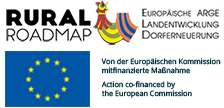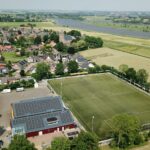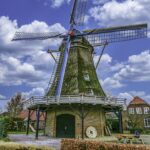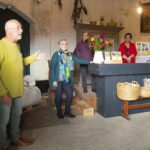Zalk, Netherlands
The village of Zalk, winner of the Dutch Village Renewal Award 2022, lies hidden behind a dike in a meandering bend of the IJssel. Since 2001, Zalk has been one of seven districts in the municipality of Kampen and is located in the province of Overijssel in the east of the Netherlands. Even if the older part of the population is increasing, the village has managed to keep its population of 750 residents stable for 20 years. Zalk is about ten kilometers from the regional economic centers of Zwolle, Kampen and Hattem. Nationally, Zalk became famous through the herb specialist “Klazien uut Zalk” and the renowned ornithologist Nico de Haan.
Zalk is a lively village where people form a close, warm and active community in mutual respect. Thanks to the “Dorpsbelangen Zalk”(Village Interests Zalk) association with its 170 members, local solutions are found for local and global challenges. Decisions affecting the village are made collectively.
The community center “Up de Steege”, built in the early 1970s, symbolizes the strong solidarity, the hospitality and the great creative drive of the people in Zalk. In 2014, with the financial support of the residents, it was completely refurbished in an impressive and careful way using volunteer work and recycled and upcycled materials. The center is run by “wajongeren” (people who, due to illness or disability, are unable to work before the age of 18 or while studying) and by volunteers. Its multifunctionality offers, among other things, space for the club of the Zalk sports association, for concerts by the Christian brass band Excelsior and the choir, which is over a hundred years old, for theater and festivals, for a play group, a library, physiotherapy and a meeting place for young people. The community center also houses the studio of the local radio and TV station «RTV Zalk». Once a week it reports on current events and broadcasts the local services in a live stream.
Neighborhood and inclusion are very important. During the corona pandemic, 80 volunteers launched the “Zalk helpt Zalk” (Zalk helps Zalk) project, which helped the elderly in particular through the difficult times. The working group “Zalk helpt Oekraïne” (Zalk helps Ukraine) was founded to take in three refugee families from Ukraine. Social cohesion has become even stronger through these projects and the Ukrainian families are very well integrated into the village community.
Sustainability is also a high priority in all projects. As part of the renovation of the community center, 29 households came together in the “Duurzaam Zalk” (Sustainable Zalk) cooperative and installed 250 solar panels on the roof of the community center. In order to further reduce CO2 emissions within the village, the village association has set up a hub in the community hall where couriers such as DHL and UPS can deliver their packages. This reduces the volume of traffic in the village and creates more social contacts in the community center when picking up the parcels. Thanks to a successful initiative from the population, the “Buurtbus” district bus and thus the connection from Zalk to public transport could be retained. Bus operations are managed by volunteers.
Zalk is located in the Natura 2000 area «Rijntakken» and in the National Landscape IJsseldelta. The unique, still original primeval forest is managed as coppice. Initiated by the village association, the hiking route “Het Laarzenpad” (“Boot path”) was set up in the flooded areas of Zalk almost ten years ago. This hiking route is now very well known throughout the country and is visited by many nature lovers. The population is working intensively on strengthening biodiversity (e.g. through a wild garden with grafted fruit trees of numerosu old varieties). Biodiversity is also maintained along paths and on roadsides: after consultation with the municipality of Kampen, it was possible to maintain the green areas in Zalk with-out the use of chemicals. This work is carried out by the residents themselves and paid for by the municipality of Kampen. The income generated by this is in turn used for the maintenance of the community center.
The commitment of the population is also reflected in the preservation of the historic building fabric. In 2016, for example, the appearance of the village center around the church square from the previous century was restored as part of the “Dorpsplan+” (Village Plan +). This transformation was based on a plan drawn up by the residents themselves. The historic village center was able to preserve its unique character. This heritage also includes the only restaurant “De Oase” and the restored mill “de Valk”, which is still in use today. Unfortunately, the remaining shops have disappeared from Zalk over the years, which is why a shop with a small range of regional products was opened in the mill in 2022.
Overall, the Village Plan 2030, which was drawn up in a participatory manner in 2022, stands for a consistent continuation and further development of what has been achieved so far. Because there are not enough suitable apartments for young people in Zalk, the latest initiative in the form of “Collective Private Ownership” was started. In order to counteract the aging of the population and to give young people and families the opportunity to continue living in Zalk in the future, there is a constant supply of apartments on the Zalk housing market. Around 24 apartments and houses are currently being built on two plots of land. The energy cooperative “Duurzaam Zalk” is also currently examining whether it should participate in the construction of a solar park, which could make Zalk energy-neutral by 2030.
Evaluated: 2022






